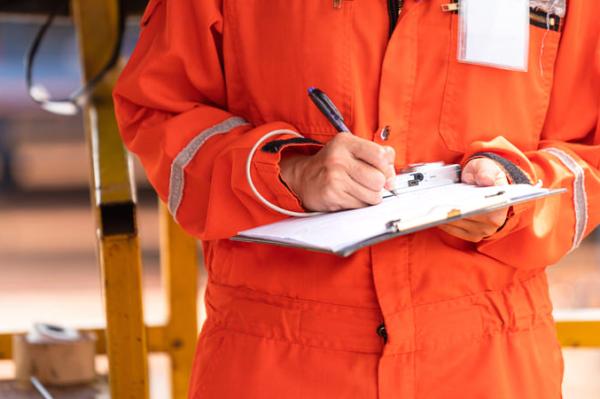Blog Post
Understanding The Basics of The Safety Officer Course And Its Benefits

The importance of health and safety in the workplace is paramount, and every business needs a qualified compliance leader with a certification in the safety officer course. Without it, the business risks penalties for failing to make the workplace a safe, hazard-free space.
All businesses need to be acutely aware of health and safety compliance, and the safety officer course (OHS8) is a must have for an assigned employee. The course itself is far more practical than theoretical and sets you up to perfectly comply with South African legislation across all operations.
The aim of the course is to give you the tools and knowledge needed to effectively manage workplace safety, health hazards, and maintain compliance with the relevant workplace legislation. In this article, we'll cover all the key important points surrounding this course, the key requirements, and where to find a safety officer course near you.
The Key Elements of The Safety Officer Course
Remember, as a business owner or manager, the health and safety of your workplace is your
responsibility. As
such, finding a good fit is essential. Understanding the core elements of the Safety Officer Course is
key,
as you'll have a much clearer idea of which staff members to nominate.
The major elements of the course cover the following topics:
OHSA Legislation, Risk Assessment and Hazard Management
The course covers all the important legal considerations, including national laws as well as
industry-specific health and safety legislation. The program covers the responsibilities of each staff
member, including employees and employers.
The Safety Officer's job is to keep the workplace safe and protect from all potential hazards. The course also runs through the different regulatory bodies, as well as their role in occupational health and safety.
Part of being a safety officer is knowing how to assess risks to avoid emergency situations. This means having policies and guidelines in place that keeps everyone on the same page. Mishandling a potential hazard can destroy your business and put all of your staff members at risk.
Safety Audits and Inspections
The safety officer should be sufficiently prepared to perform safety inspections and audits that keep
everything aligned with the relevant legislation. Regular audits help keep the workplace safe as safety
officers take note of safety concerns and follow up with corrective action.
Without regular audits and safety policies in place, there is a much higher risk of something hazardous happening. The best method of protection is prevention, and safety audits and policies do wonders for preventing accidents and mishaps.
Emergency Readiness and Accident Investigation
Your business should always be prepared for emergencies, and the safety officer should lead the charge
in
terms of preparing said readiness. The course equips the safety officer with the knowledge needed to
prepare
employees in case of emergencies, such as fires or emergency evacuations. When all staff members are
fully
aware of safety protocols, the chances of harm to your staff members is significantly reduced.
Should any unfortunate health and safety issue occur in the workplace, it's the job of the Safety Officer to lead the investigation and get the key facts. The course covers how to go about these investigations, how to determine root causes, methods for putting together evidence, and the key reporting and documentation requirements for dealing with safety incidents and near-misses.
The Importance of PPE (Personal Protective Equipment) and Environmental Factors
The course also covers the importance of PPE in specific scenarios. A qualified safety officer guides
employees on which PPE equipment to use in which scenarios for the best chances of protection. Different
industries come with different guidelines, and it's important your business and safety officer know all
the
key points regarding PPE.
The course touches on environmental health hazards in the workplace and how best to deal with them. This includes introducing strict policies and guidelines when dealing with waste management, emissions control, and more.

How Long Is The Safety Officer Course?
In general, the course can be completed in under two weeks. A typical safety officer course has a minimum duration of at least 10 days.
What Is The Best Course For A Safety Officer
The OHSA (Occupational Safety and Health Administration) course is best for a Safety Officer. As OSHA certification is required from many employers, this internationally accepted and accredited course provides you with the right qualification for operating as a Safety Officer.
Mining Safety Officer Courses
To become a Mining Safety Officer, or any Health and Safety Officer registered with a professional body such as the South African Institute of Occupational Safety and Health (SAIOSH), you will need an accredited certificate at NQF level 5 or equivalent. You can then work as a Safety Officer, and you will also have access to professional development opportunities at resources.
How Much Is A Safety Course?
The price of a safety course may vary from place to place. In general, you can expect a health and safety officer course to cost R8, 410 excluding VAT.
What Is The Minimum Salary For A Safety Officer in South Africa
In South Africa, entry-level safety officers earn between R180, 000 and R240, 000 per year. Salaries may
vary depending on experience, your employer and the market conditions.
How Much Is The Safety Officer Course At UNISA?
At UNISA, registration takes place from 1 December until the end of March. The fee per candidate R7, 200
and
includes all study material and examination fees.

Safety Officer Course Requirements
The first step to completing a safety course is to understand what requirements are expected of you to enrol. In this section, we cover some of the key requirements for becoming a safety officer in South Africa.
Do You Need Matric To Become A Safety Officer?
Most safety officer courses require you to have a South African Senior Certificate (Grade 12) or an
equivalent qualification.
Which Certificate Is Best For A Safety Officer?
For anyone hoping to enter the HSE field or earn a better position within it, consider the following
certifications:
- Certified Safety Professional (CSP)
- Certified Industrial Hygienist (CIH)
- Certified Safety and Health Manager (CSHM)
- Institute of Occupational Safety and Health (IOSH) Level 3 Certificate
All the above qualifications can set you up for a career in health and safety.
What Characteristics Should A Safety Officer Have?
To be a safety officer, there are a few key characteristics and personality traits needed. You should be
trustworthy, reliable and efficient. You should have strong communication and administrative skills and
respond timeously to queries and concerns.
You should also be a confident person willing to address those at fault for not complying with safety standards, and you should take accountability in your role as the assigned Safety Officer. Additionally, you should be able to think outside of the box to solve complex problems related to safety.
How Long Is Officer Training Course?
In an Officer Training Course, you will go through 12 weeks of training in OCS to ensure you're prepared
to
successfully lead others.

Safety Officer Courses Near Me: How To Sign Up
At EMCARE, we offer world class accredited courses in health and safety; from fist aid and emergency response to fire fighting and workplace safety. Our legal compliance training service sets your business up to meet all compliance requirements regarding occupational health and safety.
If the safety officer course interests you, all you have to do is head over to our website and contact us for more information. We're always ready to assist and help you take the first step on your journey to effectively managing health and safety issues.
Occupational health and safety are more than just an accreditation, it helps you keep everyone safe and comfortable. No matter the industry, health and safety is important.
We have training offices throughout South Africa, from Cape Town to Polokwane, to make sure every business has the tools and knowledge to remain compliant and keep the workplace safe. Don't waste time, reach out to us online today to find out more about our safety courses.
GET IN TOUCH
There are a few ways to reach us below. Please feel free to contact us via phone, email or you can send us a message via the form provided and we will get back to you.




















